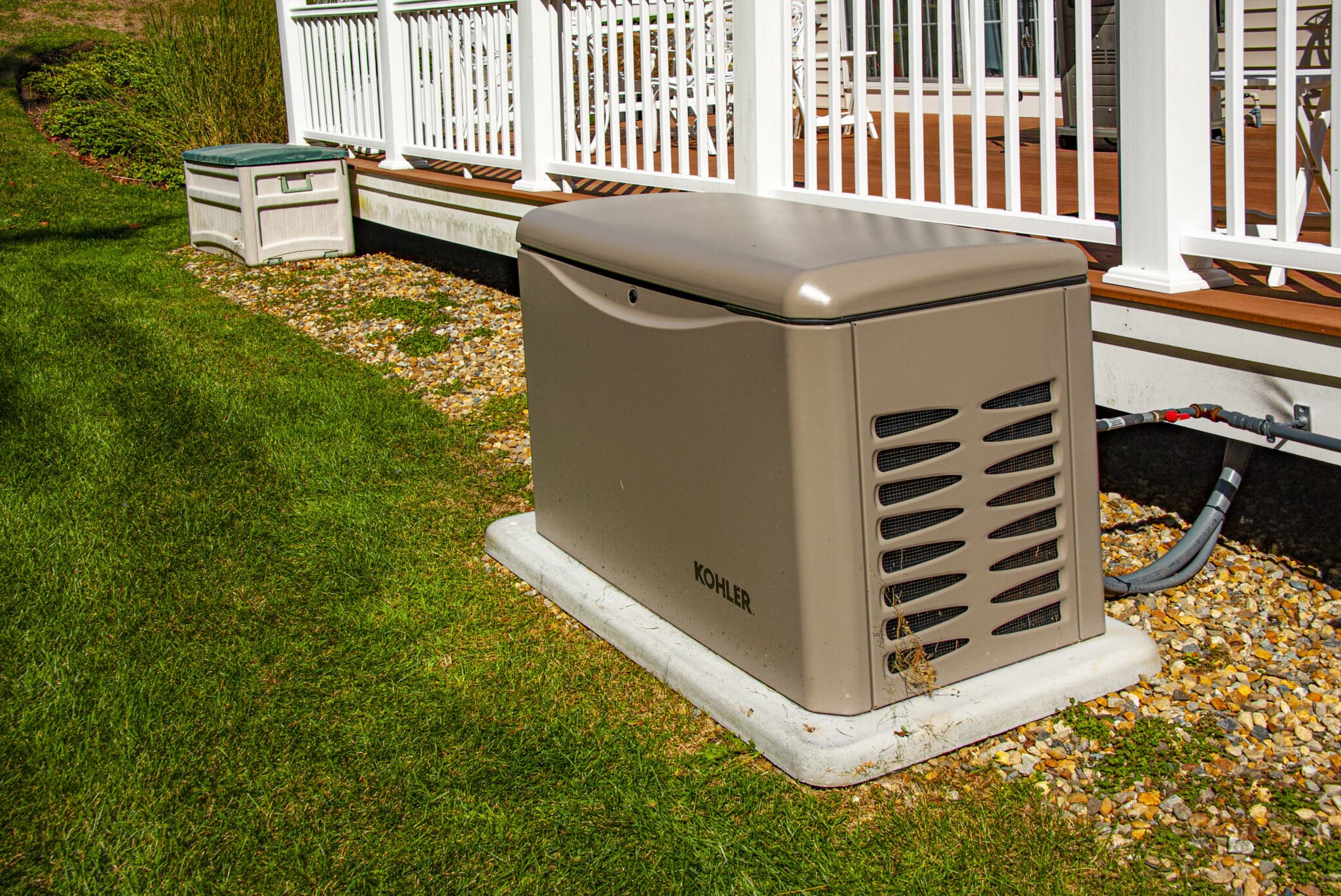Winter often leads to unexpected power outages, leaving homes cold, dark, and vulnerable. A standby generator provides a reliable solution to ensure your household remains safe, warm, and fully functional during these disruptions.
This guide explains the importance of choosing the right standby generator, its advantages, and essential considerations before purchasing. With proper planning, a generator can protect your home and family from the risks associated with winter power loss.
Why a Standby Generator Is Essential During Winter
Reliable Power Backup
A standby generator ensures that your home remains powered during winter outages by automatically restoring electricity when the grid goes down. Essential appliances such as heating systems, refrigerators, and lights are kept running without interruption, maintaining safety and comfort.
This reliability is vital during extreme weather when access to heat and light can make a significant difference. Unlike portable generators, standby systems are permanently installed and provide seamless operation, requiring no manual intervention. They deliver consistent power, allowing households to avoid the inconveniences and hazards of extended blackouts.
Prevents Winter-Related Risks
Winter often brings unique risks, such as frozen pipes, food spoilage, and reduced access to life-sustaining medical equipment. A standby generator helps eliminate these concerns by providing consistent power to essential systems, ensuring a warm and functional home environment.
Frozen pipes can burst and cause extensive damage, but with a generator, your heating system remains operational, preventing such disasters.
Additionally, refrigeration and freezer systems continue to preserve food, reducing waste and avoiding health risks. A standby generator mitigates many dangers associated with winter outages by maintaining a steady supply of power.
Increased Frequency of Winter Outages
Winter months are particularly prone to power outages due to severe weather, including snowstorms, ice accumulation, and strong winds. These conditions often result in downed power lines and damaged transformers, leaving homes in the dark for hours or even days.
The likelihood of experiencing outages during this season makes a standby generator a crucial part of a home’s winter preparedness. Generators provide peace of mind by offering continuous power, ensuring that your household remains functional regardless of the external conditions. With increasing climate unpredictability, investing in a standby generator has become a practical and necessary measure for homeowners.

How a Standby Generator Works
Automatic Operation
A standby generator is designed to detect power outages automatically and restore electricity within seconds, ensuring minimal disruption to your household. It uses sensors to monitor your home’s electrical supply and immediately activates when it identifies a loss of power.
This seamless operation eliminates the need for manual setup, providing convenience and reliability. Once the main power is restored, the generator shuts off automatically and transitions your home back to the utility grid. The entire process happens quickly and smoothly, allowing you to focus on staying safe and comfortable during an outage.
Connection to Your Home’s Electrical System
Standby generators are permanently installed and integrated with your home’s electrical system for reliable operation. They are connected through a transfer switch that manages the transition between utility power and generator power.
This connection allows the generator to power critical circuits directly, ensuring essential appliances like heating systems and refrigerators remain functional.
The integration is designed to handle varying electrical loads, providing a customized solution based on your household needs. This setup ensures that the generator operates efficiently and consistently during an outage, protecting your home from the effects of power loss.
Powered by Fuel
Standby generators typically operate on natural gas, propane, or diesel fuel, ensuring they can run continuously as long as the fuel supply is available. Natural gas generators offer a steady supply from a utility line, making them ideal for extended outages.
Propane is another popular choice due to its portability and ability to be stored in large quantities. Diesel-powered generators are known for their efficiency and high power output, making them suitable for larger homes or heavy usage.
Each fuel type offers unique benefits, allowing homeowners to choose the best option for their location and requirements.
Key Benefits of a Standby Generator
Keeps Essential Systems Running
A standby generator ensures that critical systems like heating, lighting, refrigerators, and medical devices remain operational during a power outage. Providing uninterrupted power protects your home from the risks associated with sudden electricity loss, such as frozen pipes or spoiled food.
This is particularly crucial during winter when maintaining warmth and preserving food supplies are vital. The generator is designed to supply consistent energy, allowing you to maintain normalcy even during extended outages. With this system in place, your household stays safe, functional, and comfortable regardless of external conditions.
Improves Safety
Safety is a major benefit of owning a standby generator, as it prevents risks associated with power outages. Frozen pipes, which can burst and cause water damage, are avoided by maintaining indoor heating.
Proper lighting reduces the chance of accidents, especially during long, dark winter nights. Food stored in refrigerators and freezers remains safe to consume, eliminating health risks caused by spoilage. Additionally, standby generators support critical medical equipment, ensuring the well-being of individuals who rely on electrically powered devices.
Convenient and Reliable
Unlike portable generators, standby models activate automatically when a power outage occurs, requiring no manual setup. This convenience means you don’t need to worry about connecting equipment, starting the generator, or refueling it during bad weather.
Reliability is another significant advantage, as these generators are permanently installed and designed to handle power needs for an extended duration. They provide peace of mind, knowing that your home is prepared to handle power disruptions without any additional effort on your part.
Adds Value to Your Home
Investing in a standby generator not only protects your home during outages but also increases its overall value. Buyers often view a generator as a desirable feature, offering security and reliability.
This can make your property more appealing if you ever decide to sell. Additionally, having a generator reduces potential costs from damages caused by outages, such as burst pipes or spoiled food. It’s a practical investment that provides both immediate benefits and long-term returns for your household.
Protects Home Automation Systems
Modern homes often rely on automated systems such as smart thermostats, security systems, and connected devices. A reliable power source ensures these technologies remain functional during outages, maintaining the convenience and security they provide.
Without power, these systems could shut down, leaving your home vulnerable to intrusions or environmental damage. A generator protects these investments, keeping your home running smoothly in any situation.
Minimizes Business Interruptions for Home Offices
For those working from home, a power outage can mean lost productivity and disrupted schedules. A backup power system ensures that computers, internet routers, and office equipment stay operational.
This uninterrupted power supply helps maintain professional obligations and reduces the financial impact of outages. With a generator, home-based workspaces can continue to function seamlessly during power disruptions.
Reduces Stress During Emergencies
Power outages can be a source of significant stress, especially during extreme weather or extended blackouts. Having a reliable generator provides peace of mind, knowing that your household is prepared for unexpected situations.
This readiness allows you to focus on other priorities, such as family safety and comfort, instead of worrying about restoring power. The consistent performance of a backup generator alleviates concerns and helps you navigate emergencies with confidence.
Factors to Consider When Choosing a Standby Generator
Power Requirements
Understanding your home’s power needs is crucial when selecting a standby generator. Calculate the wattage required for essential systems such as heating, lighting, refrigerators, and medical devices. For smaller households, a generator that powers only critical appliances may suffice, but larger homes might require a whole-home system.
Consider future needs, as upgrading appliances or adding new ones may increase your power demands. Choosing the right generator size ensures uninterrupted operation without overloading or underutilizing the system.
Fuel Type
Standby generators typically run on natural gas, propane, or diesel, each with distinct advantages. Natural gas is an excellent choice for homes with access to a utility line, offering an unlimited fuel supply during extended outages.
Propane is portable and can be stored in large quantities, making it versatile for areas without natural gas infrastructure. Diesel generators are highly efficient and provide substantial power output, though they require proper storage for fuel. Evaluate your home’s fuel availability and preferences to select the option that best fits your situation.
Size and Capacity
The size and capacity of a standby generator determine how much of your home it can power during an outage. Smaller units are ideal for running essential appliances, while larger generators can handle the demands of an entire household.
Assess your priorities, such as whether you need heating, lighting, and refrigeration alone or a whole-home backup. Consulting with a professional electrician can help identify the correct capacity based on your home’s electrical load.
Brand and Warranty
Choosing a reputable brand with a solid warranty ensures reliability and peace of mind. Well-known manufacturers provide robust support and access to local service providers for maintenance and repairs.
A strong warranty demonstrates the manufacturer’s confidence in their product and protects your investment. Research customer reviews and consult professionals to identify brands with proven performance and responsive customer service.
Noise Level
Noise level is an important consideration, particularly for residential areas. Some standby generators are designed with noise-reducing features, making them quieter during operation. Quieter models are ideal for maintaining a peaceful home environment and adhering to neighborhood regulations.
Compare decibel ratings when evaluating generator options, and select one that balances power output with minimal noise. This ensures comfort and compliance without sacrificing performance.
Installation Tips for Standby Generators
Consult a Professional Electrician
Proper installation of a standby generator requires the expertise of a licensed electrician to ensure safety and reliability. Professionals assess your home’s power requirements, determine the appropriate generator size, and handle the connection to your electrical panel. This ensures seamless operation and prevents potential hazards, such as improper wiring or overloading circuits.
A professional will also ensure that your generator is compatible with your home’s existing electrical setup. Their guidance and expertise are essential for a safe and efficient installation.
Adhere to Local Regulations
Installing a standby generator often involves permits and compliance with local building codes. These regulations are designed to ensure the safety of your home and surrounding properties.
A professional electrician will help navigate the permitting process and verify that the installation meets all legal requirements. Failure to adhere to these codes could result in fines or safety risks. Staying compliant ensures your generator operates legally and safely.
Choose a Safe Location
The placement of a standby generator plays a critical role in its efficiency and safety. Generators should be installed outdoors in a well-ventilated area, away from windows, doors, and vents, to prevent carbon monoxide buildup.
The location should also be elevated or on a solid foundation to avoid water damage during heavy rain or flooding. Proper positioning ensures the generator functions reliably and minimizes risks to your household.
Schedule Regular Maintenance
Routine maintenance is essential to keep your standby generator in peak operating condition. This includes checking the fuel system, cleaning filters, testing connections, and ensuring the unit starts properly.
Scheduling periodic inspections with a professional technician will identify any issues before they become serious. Regular maintenance ensures your generator remains reliable and ready to perform when needed most.
Benefits of Professional Installation
Ensures Safety
Professional installation guarantees the safe operation of your generator by ensuring proper wiring, fuel connections, and ventilation. Incorrect installation can lead to hazards such as carbon monoxide leaks or electrical fires, both of which pose significant risks to your home and family.
Certified electricians are trained to handle these complexities, reducing the likelihood of dangerous mistakes. Their expertise ensures that the system functions as intended without compromising safety. This level of assurance makes professional assistance an invaluable part of the installation process.
Maximizes Efficiency
When installed by a professional, your backup power system is optimized for efficient operation. Electricians evaluate your home’s power requirements and ensure the generator is correctly sized and connected to critical circuits.
This setup avoids wasted energy and ensures that power is directed to essential appliances and systems. Proper installation also minimizes energy loss, which can occur with incorrect connections or inadequate equipment. With expert installation, you can trust that your generator will perform at its best when you need it most.
Guarantees Compliance
Compliance with local codes and manufacturer guidelines is critical when installing a generator. Permits and inspections are often required to ensure the system meets safety and legal standards.
A licensed professional ensures that all aspects of the installation are compliant, protecting your investment and maintaining any warranties. Noncompliance can lead to costly fines or voided warranties, making professional guidance essential for peace of mind. Following these regulations helps your system operate smoothly and legally.
Provides Expert Guidance
Electricians not only install your power system but also offer valuable advice on selecting the right model for your needs. Their knowledge of different fuel types, capacities, and features ensures you make an informed decision.
They can recommend the best location for the unit, explain maintenance requirements, and answer questions about its operation. This expert insight helps you get the most out of your investment and ensures you’re prepared for any future outages.
Stay Powered This Winter with Mister Sparky of Charleston
Don’t let winter storms leave your home in the dark. Mister Sparky of Charleston offers expert generator installation services tailored to meet the needs of homeowners in the Charleston area.
From selecting the right unit to professional installation, our team ensures your home stays safe, warm, and powered during any outage. Contact us today to schedule your consultation and enjoy peace of mind all season long!

Frequently Asked Questions (FAQ)
1. How do I determine the right size generator for my home?
Calculating the wattage of essential appliances and systems is the first step. Make a list of items you want to power during an outage, such as heating systems, refrigerators, lights, and medical devices. Add up their wattage requirements to determine the total capacity needed.
2. How long can a generator run during an outage?
The runtime depends on the fuel source and capacity. Natural gas models can operate indefinitely if connected to a utility line, while propane and diesel options rely on stored fuel. Larger storage tanks extend runtime, but regular maintenance and fuel supply monitoring are crucial for continuous operation during extended outages.
3. Do I need a permit to install a generator?
Most local jurisdictions require permits and inspections for generator installations. Permits ensure that the installation complies with building codes and safety standards. Working with a licensed professional simplifies the permitting process, ensuring your installation is both legal and safe.
4. Can I install a generator myself?
DIY installation is not recommended due to the complexity and risks involved. Professional installation ensures proper wiring, fuel connections, and adherence to local codes. It also protects warranties and reduces the chances of safety hazards, such as carbon monoxide leaks or electrical issues.
5. What maintenance is required to keep my generator running smoothly?
Routine maintenance includes checking the fuel system, cleaning air filters, inspecting connections, and testing the unit’s startup capabilities. Scheduling regular professional inspections ensures the system remains in optimal condition and is ready to operate during an outage.






